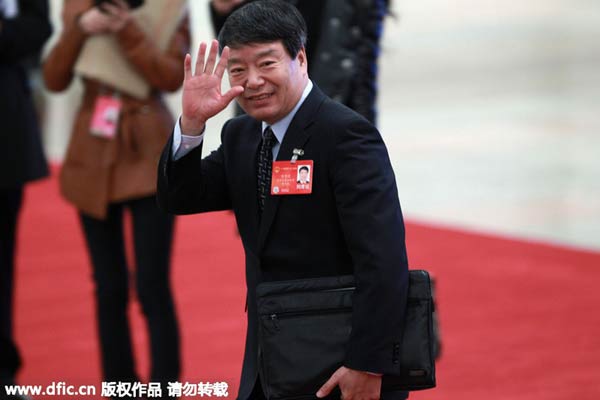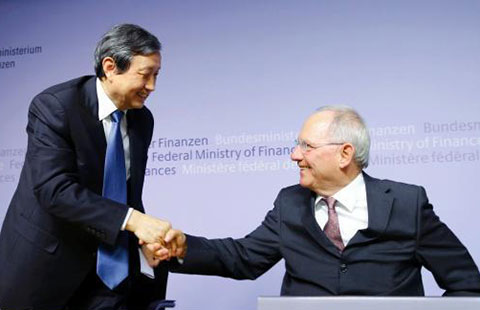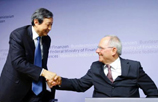NDRC head sees pivotal role for investment
By LAN LAN/CHEN JIA (China Daily) Updated: 2015-03-06 08:01
 |
|
Xu Shaoshi, minister of the National Development and Reform Commission waves to reporters in Beijing on March 5. [Photo/IC] |
Investment will continue to play a crucial role in driving China's slowing economy this year to offset domestic and global downturn pressures, but policymakers won't enact bold stimulus measures, the head of China's top economic planning agency said on Thursday.
Xu Shaoshi, minister of the National Development and Reform Commission, said that attracting social and private capital is crucial to China's economy this year.
The country will initiate major new projects in the year ahead, focused particularly on railway and highway projects in the middle and western regions of China; waterway transport projects; major telecommunication networks; oil and gas pipelines; clean energy; and environmental protection, Xu said at a news conference held on the sidelines of the two sessions.
Xu said exports and consumption are likely to be flat this year due to weak global and domestic demand, so investment will continue to play a key role in driving the economy.
As a big economy under the process of industrialization and urbanization, China has great potential in strengthening necessary investment, Xu said. "Bold stimulus" won't be a concern, so the challenge lies in improving the efficiency of investment, he added.
According to the NDRC's annual report, fixed asset investment this year is expected to increase by 15 percent year-on-year, almost the same as last year's level, 15.8 percent.
The NDRC is taking charge of 477.6 billion yuan ($76.2 billion) of central budgetary allocation this year, accounting for less than 1 percent of China's overall fixed asset investment, which hit 51 trillion yuan last year.
"The government will expand market access and innovate financing mechanisms to leverage social and private sector investment, which is very important," said Xu.
Xu Hongcai, a senior economist at the China Center for International Economic Exchanges, a leading think tank, said that "China's economy is unlikely to suffer a hard landing, but the risks exist".
Experts said investors were hesitating to invest, particularly because of industrial overcapacity and a sputtering housing market.
- Israel requests to join Asian Infrastructure Investment Bank
- Chinese stocks rebound on April 1
- China, the West in Africa: more room for cooperation than competition
- Nanjing cuts taxi franchise fees
- Air China increases flights to Milan, Paris
- JD.com raises delivery charges
- Veteran corporate strategist upbeat about China economy
- L'Oreal China sales revenue up 7.7% in 2014

















